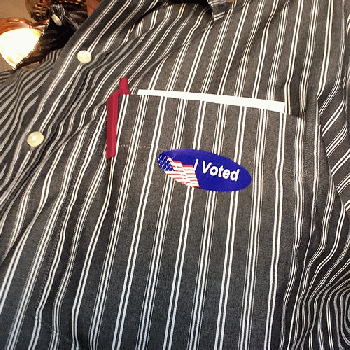On Friday, the new Democratic majority in the House of Representatives passed House Resolution (HR) 1, or the "For The People Act," with 100% Democratic support.
Not a single Republican voted for it.
This may come as no surprise, especially in today's tribal political milieu.
But when we break down what HR 1 seeks to address, we get a better look into how the modern-day GOP is just fine with corruption, corporate greed, and an anti-democratic ideology.
HR 1 is broken down into three sections:
- Protecting and expanding voting rights and election security
- Reducing the influence of big money in our political process
- Ensuring an ethical government accountable to the people, not corporations
Section one, dedicated to voting rights, supports to following:
- Automatic, online, and same-day voter registration
- Making election day a federal holiday
- Restoring voting rights to ex-felons
- Expanding early voting to 15 days, simplifying absentee voting, and voting by mail
- Prohibiting voter purges from registration rolls
- Enhancing election security with increased support for a paper ballots and increased oversight over election vendors
- Ending partisan gerrymandering through independent redistricting commissions
- Prohibiting to ability to provide false information about the electoral process and other deceptive practices designed to discourage voter turnout.
- Making interfering in voter registration a felony
- Preventing current election officials from being allowed to run for federal office
Section two, about the corrosive influence of big money in politics, boasts:
- Requiring clandestine organizations to disclose their donors
- Upgrading online political spending-transparency rules so voters know who is paying for advertisements
- Creating a small grassroots public financing-matching system so congressional candidates aren't forced to rely on big money donors
- Strengthening oversight rules so those guilty of violating campaign-finance laws are held accountable
- Overhauling the Federal Election Commission (FEC) so it appropriately enforces campaign-finance laws
- Prohibiting shell companies from pumping foreign money into U.S. elections
- Requiring government contractors to disclose their political spending
- Requiring the IRS to regulate 501(c)4 organizations.
- Requiring presidential inaugural committees to disclose funding and spending.
- Requiring public campaign-fund matching for House candidates, for which there will be a 6:1 public match up to $200 per contributor, candidates must reject large donations in order to be eligible, and they must demonstrate broad public support.
Section three, seeking to ensure accountability to the people instead of wealthy corporations, states:
- Addressing the "revolving door" between government officials and lobbyists
- Expanding conflict-of-interest laws
- Banning congressional members from sitting on corporate boards
- Requiring major party presidential candidates to release their tax returns
- Overhauling the Office of Government Ethics to strengthen enforcement of ethics rules
- Requiring a judicial code of ethics for U.S. Supreme Court justices
Once again, not a single Republican voted in favor of these sweeping changes to our electoral system.
This means not a single Republican is willing to go on the record favoring free and fair elections.
Senate Majority Leader Mitch McConnell labeled HR 1 a "radical, half-baked socialist proposal," "a political power grab."
Of course it's "socialist;" everything Republicans oppose now is going to be maligned as "socialist."
But how can legislation that doesn't address a single economic issue be socialist?
HR 1 is about reforming our elections and campaign finance, two issues Republicans don't want to touch since they primarily benefit from the status quo.
As Senate Minority Leader Chuck Schumer (D-NY) said:
(Note: You can view every article as one long page if you sign up as an Advocate Member, or higher).






